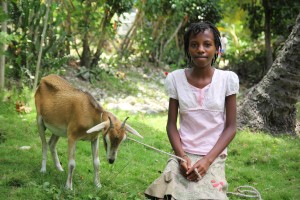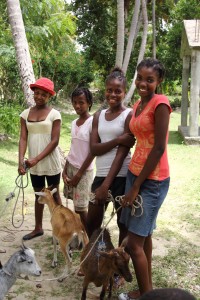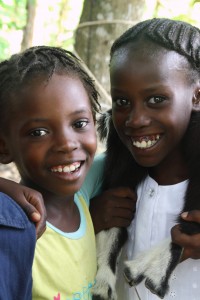Humanitarian Aid
Goats and Girls Education: A "Baton" For Life

Although we’ve been taught that there is no “silver bullet” to combating poverty, education may be an exception. The impact education can have in the lives of children—especially girls—is overwhelming.
- One extra year of school boosts a girl’s future wages by 10-20 percent.
- A girl who completes basic education is three times less likely to contract HIV.
- Education drastically reduces child marriage. On average, a girl with 7 years of education will marry 4 years later and have 2.2 fewer children.
If statistics are not convincing, listen to girls themselves. I’ve found that in Haiti girls yearn to attend school and know full well the value of an education.
“School is important because you need to learn things so you can have an occupation,” said 12-year-old Rocheka who lives in the small coastal village of Crabier in southern Haiti.

Rocheka with her goat
So what’s with the goats we talk so much about? And what do goats have to with education? Well I’m glad you asked.
In rural parts of Haiti World Concern has found that the gift of a goat can help keep girls in school for the long run. Here’s how:
In partnership with schools and churches, World Concern gives a female goat to a young girl who also receives basic goat husbandry training so she knows how to take care of her goat. Once the goat has babies (called kids; funny but totally legit), the first kid is given back to the program so another child can benefit. Then all other kids that the female goat gives birth to can be sold by the girl to pay for school fees and other related costs such as books, materials and uniforms.
This way the girl is given a skill (goat-raising) and she is able to contribute towards her education, reducing dependency and making her an active participant instead of a passive receiver.
There are three primary advantages to the ‘goat model’:
-
Life lessons. When a goat is initially given to a girl, she also receives basic goat husbandry training. The training focuses on how to feed the goat and keep it healthy. A goat is an asset in rural Haiti and represents an important source of income that girls can use to pay for school fees and other necessities. It’s important from the beginning to give girls the skills they need to take care of the goat. The goat husbandry knowledge they gain during the training is something they can use for years to come, even after they finish school. Since a goat requires consistent attention, girls learn important life lessons such as responsibility, discipline and ownership. Aside from the initial training, World Concern staff returns each month to teach girls and other students about additional tips and techniques for raising their goat.
-
“Multiplying effect.” When a goat is given, its impact goes beyond the girl who initially received the goat. The first kid that goat produces is returned to the program so it can be given to another child. This is one reason that our goat program in Haiti has existed since 1998 and continues to this day. The gift of a goat has a significant impact in the life of a girl but it also is a gift that multiplies over time, impacting other children as well.
-
The gift that (literally) keeps giving. “Each year a goat will give between six and nine kids, and she typically can produce kids for up to 10 years,” explains Pierre, World Concern’s regional coordinator for southern Haiti. The kids that a goat produces represent income for a young girl so she can attend school and most importantly stay in school. All goats, minus the first, are hers to sell. Enabling a girl to earn an income and pay for school lightens the financial burden on her family and allows the family’s precious resources to be spent on other critical needs.
World Concern provides vaccinations to goats in the program as well as on-going veterinary care. This ensures that the investment of a goat will truly benefit a girl long term.

Rocheka (second from left) and friends outside their church in Crabier.
Rocheka is one of many girls in Haiti who are able to stay in school thanks to the gift of a goat. Rocheka is a soft spoken yet determined and bright girl who has big dreams.
“After I finish secondary school, I would like to be a nurse so I can take care of children because many children suffer from disease,” she shared.
Youslie is a 7-year-old girl who lives in the village of Guilgeau and is currently in the second grade.
“In school I like to read stories,” she said.
Youslie recently received her goat and is enjoying taking care of it.
“I feed the goat twice a day things like corn and corn husk,” said Youslie. “Once the goat has babies I will drink the milk.”

Youslie (left) and her friend Belony in Guilgeau.
In Haitian Creole, the language spoken by all Haitians, the word baton is significant. Translated directly it means ‘stick’ or ‘baton’ however it has a deeper meaning. A baton can also be a skill or ability that a person possesses which will help them succeed in life. This meaning is often used in reference to education.
Following earning a certificate from a trade school or graduating from high school, someone may say, “Now I have a baton I can use to fight in life.” With a baton, a person is given a tool which will help them in their pursuit of a more healthy and productive life.
In Haiti, girls face many challenges which leave them vulnerable—generational poverty, limited financial resources and lack of opportunity. At World Concern, we want to give girls a baton that will help carry them through some of these challenges. Education is one baton that has a long-term impact on the life of a young girl.
Girls like Rocheka and Youslie are the future of Haiti. Helping them stay in school is an investment in their life but also has an impact on their family, community and country.
Help us impact more girls in Haiti by giving the gift of a goat today!
